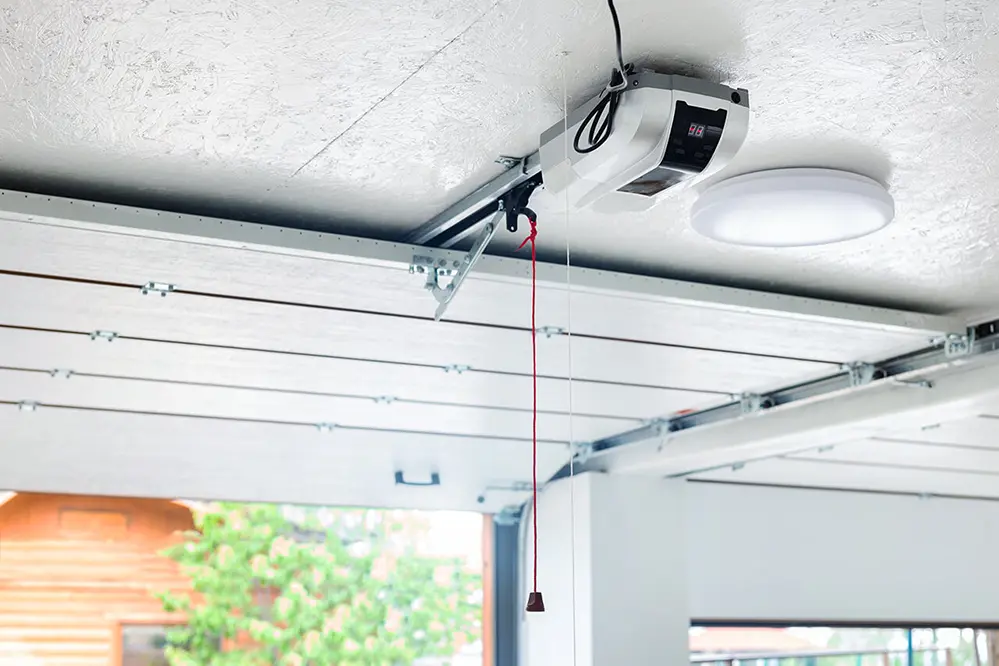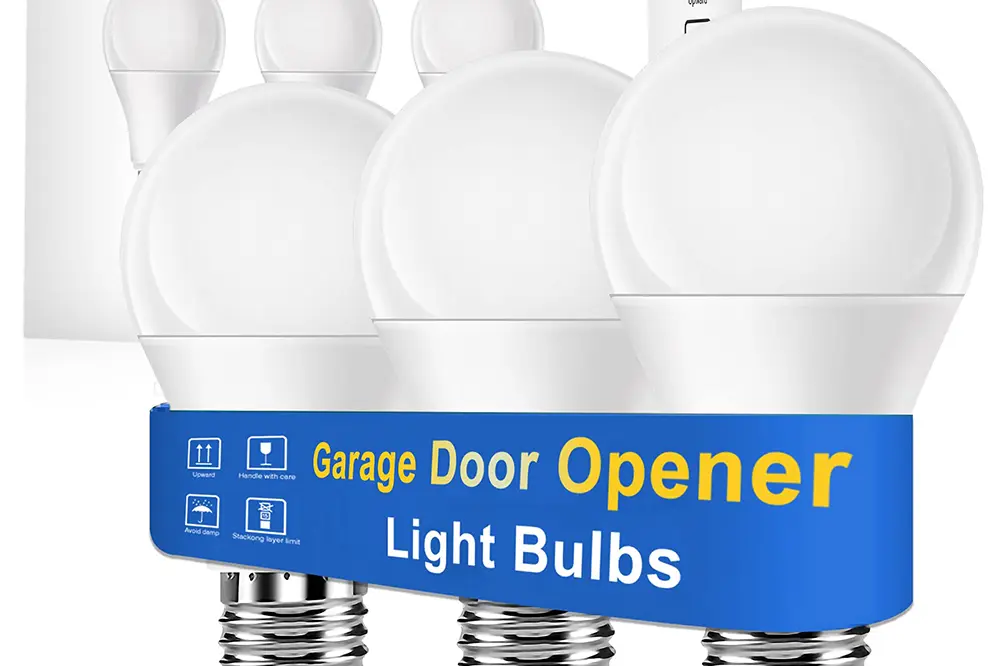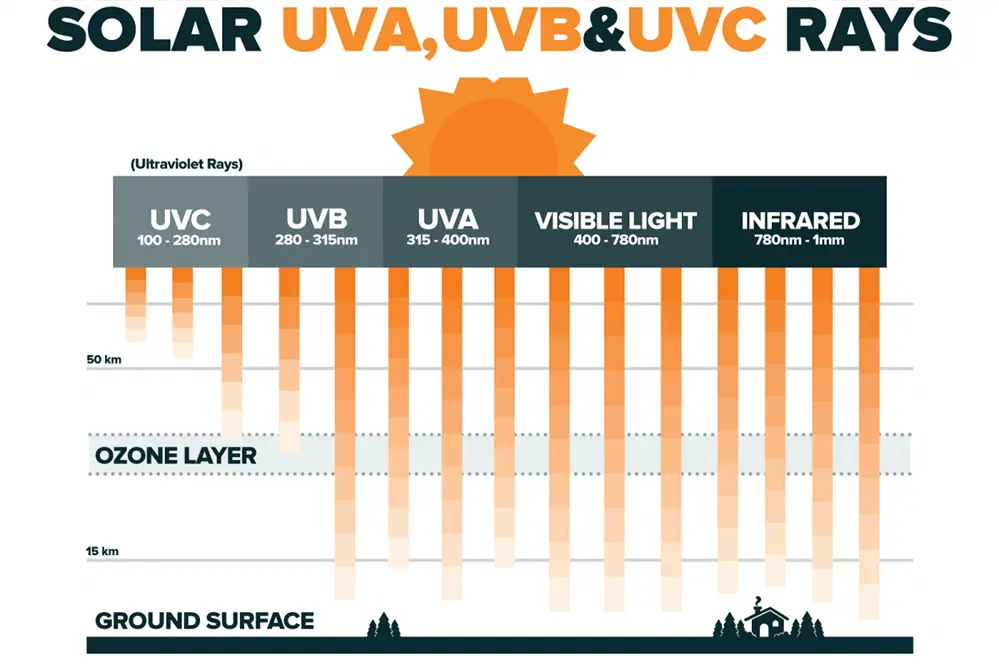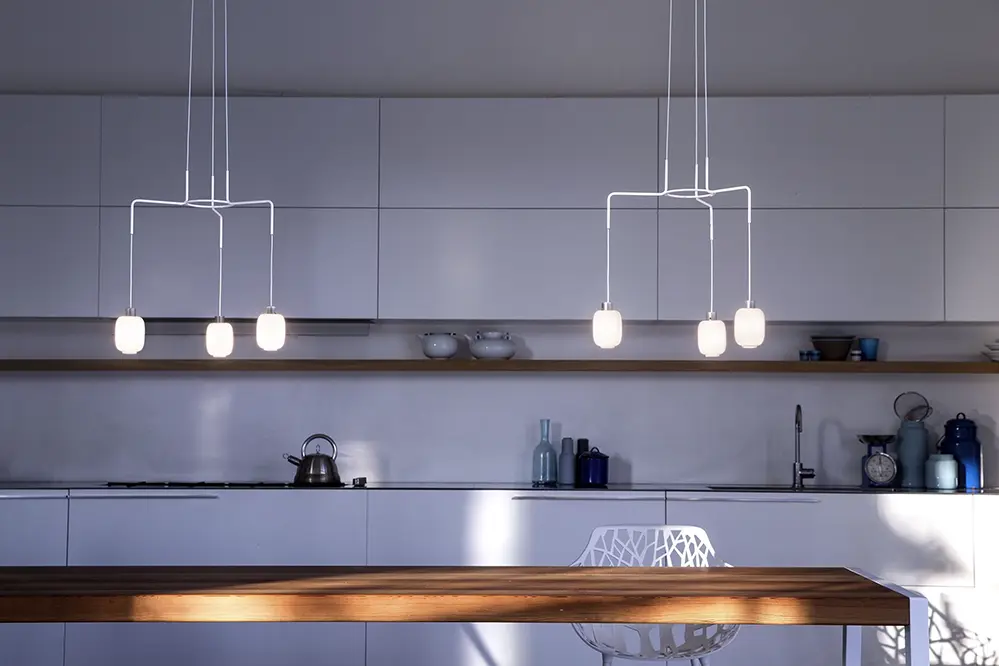Are you experiencing issues with your garage door opener and suspect your LED lights might be the culprit? You’re not alone. Many homeowners face this puzzling situation, but rest assured, we have the answers you need.
LED lights can interfere with garage door openers due to electromagnetic interference (EMI) emitted by some LED bulbs, which can disrupt the radio frequency signals used by the openers.
Curious about how this interference happens and how to prevent it? Read on to uncover the truth behind LED lights and garage door openers, and discover practical solutions to keep your garage door functioning smoothly.
Understanding LED Lights
LED lights represent a remarkable evolution in lighting technology, heralding a future of energy efficiency and innovative design. These bright, enduring light sources have become an integral part of modern living, illuminating everything from cozy homes to bustling offices.
Primarily, the efficiency of LED lights stems from their low energy consumption. Unlike traditional incandescent bulbs, LEDs convert most of their energy into light, reducing the waste of excess heat.
Moreover, advancing technology allows LED lights to offer longevity and durability, often boasting lifespans of up to 50,000 hours. This means fewer replacements and a smaller environmental footprint.
The versatility of LED lighting is manifest in its ability to fit diverse needs, from ambient lighting in living spaces to high-intensity lights in areas requiring greater visibility. With various color temperatures, LEDs can cater to any mood or functional requirement.
However, it’s important to acknowledge that while the benefits of LEDs are vast, they can occasionally emit electromagnetic interference. This interference may affect electronic devices, including garage door openers, under certain conditions.
Yet, the power lies in your hands to embrace these lights’ advantages, minimizing potential drawbacks. By adopting measures to limit interference, you can ensure your home is not only brighter but also efficiently functional.
How Garage Door Openers Work

Garage door openers rely on a combination of electrical, mechanical, and infrared technologies to facilitate smooth and secure operation.
They consist of three main components: a motor unit, control panel, and sensors.
The motor acts as the powerhouse, moving the trolley mechanism along a rail to open and close the door with precision. Meanwhile, the control panel provides the user interface, allowing homeowners to operate the door at the touch of a button.
Furthermore, safety sensors are strategically placed to ensure the door halts or reverses if it detects obstacles, safeguarding both people and belongings. The entire system works in tandem with a frequency-specific remote control, sending a radio signal to the motor unit. This sophisticated dance of technology highlights the ingenious blend of convenience and safety in modern homes.
Potential Interference Sources
In the realm of garage door technology, interference is a potential obstacle that can disrupt seamless operation and cause inadvertent inconveniences.
Indeed, one common interference source is the presence of electronic devices that emit radio frequency noise, including certain LED light bulbs. These devices may inadvertently overlap with the frequency band used by your garage door opener, causing operational misalignments and diminished performance. While LED lights are celebrated for efficiency and longevity, their electromagnetic emissions can, if unmitigated, interfere with the delicate signals required for wireless communication.
Electromagnetic emissions from LED lights may prove troublesome if they fall within proximity to the opener’s frequency range. In practice, this may result in sporadic functionality, inconsistent opening or closing, and potentially even signal interruption that affects normal garage door operations.
Fortunately, with proactive evaluation of your garage environment, interference can be effectively managed. Opt for LED bulbs that are labeled as “garage door opener-compatible” or “interference-free,” and position them at a safe distance from the opener. By embracing these strategic choices, homeowners can confidently balance the pursuit of energy-efficient lighting with the assurance of their garage door’s reliable operation, turning concern into an opportunity for enhanced home efficiency.
Do LED Lights Interfere with Garage Door Openers?
Indeed, LED lights have the potential, to a certain extent, to interfere with garage door openers, although not all LEDs will. Selecting LEDs specifically designed to minimize radio frequency interference, coupled with thoughtful placement, paves the way for seamless, interruption-free garage door operations.
Analyzing the Frequency Overlap
One potential cause of interference between LED lights and garage door openers is the similarity in operating frequencies. Understanding this is crucial to addressing compatibility issues effectively.
If LED bulbs operate on a radio frequency close to the 300 MHz garage door remote frequency, interference can occur. This overlap can disrupt the reliable communication necessary for seamless garage door operation.
Modern LED lights are engineered to minimize electromagnetic interference by incorporating radio interference suppression designs.
To mitigate this issue, homeowners can choose LED lights marked as having low radio frequency emissions. Opting for these can significantly reduce the chances of interference. By acknowledging and addressing these frequency overlaps, we can ensure our illumination choices do not compromise the functionality and convenience of automated garage doors.
Real-World Cases
Homeowners have reported instances where LED bulbs caused their garage door openers to malfunction or operate intermittently.
- Signal Interference: Some users noticed interference only when LED lights were switched on.
- Brand-Specific Issues: Certain brands of LED lights seemed more prone to causing disruptions.
- Distance Matters: Proximity between the LED lights and garage door opener significantly affected interference levels.
These concerns highlight the importance of choosing the right LED bulbs for your garage.
With careful selection and placement of LED lighting, many have overcome these challenges and enjoy seamless garage door operation.
Identifying Interference Symptoms
Observing interference symptoms can help determine if LED lights are causing issues with your garage door opener.
In many cases, the interference manifests as a garage door opener that operates sporadically, refusing to open or close on command. Additionally, problems might arise where the opener only responds when LED lights are off. These symptoms can lead to unnecessary frustration, especially when reliable access to your garage is crucial.
Moreover, interference might occur in the form of reduced range for remotes. If you notice your garage door remote only works when you are standing very close to the door, this could be a sign of signal disruption caused by LED lighting.
Thus, recognizing these telltale symptoms of interference empowers homeowners to address and rectify issues efficiently. By being cognizant of these signs, you can take proactive steps to safeguard your garage opener’s performance, ensuring peace of mind and accessibility at all times. Implementing suitable solutions and adjustments can transform potential interruptions into seamless functionality, harmonizing technology and convenience.
Factors That Increase Interference Risk
The type and quality of LED bulbs used can significantly impact the likelihood of interference.
Moreover, older Chamberlain garage door opener models often lack advanced filtering capabilities (AF) needed to prevent disruptions caused by newer LED technologies, making them more susceptible to interference.
The terms “AF” and “advanced filtering” provide crucial insights into how to mitigate such disruptions.
Proximity of LED Lights to Garage Opener
The proximity of LED lights to the garage door opener can play a pivotal role in potential interference.
- Distance Awareness: Maintain a reasonable distance between LED lights and the opener to reduce interference.
- Shield LED Bulbs: Consider using LED bulbs with proper shielding to minimize electronic interference.
- Use Quality LEDs: Opt for high-quality LED bulbs designed to be interference-resistant.
- Separate Circuits: Ensure LED lights and garage door openers operate on separate electrical circuits if possible.
- Check Compatibility: Verify the compatibility of LED bulbs with the garage opener system.
By strategically arranging LED lights at an optimal distance, interference can be effectively managed.
Taking these proactive steps ensures seamless interaction between your smart home components, boosting both convenience and performance.
Quality and Type of LED Lights
The quality and type of LED lights can significantly influence their potential to cause interference.
- Opt for Interference-Free LEDs: Choose LED bulbs specifically designed to minimize electromagnetic interference.
- Select High-Quality Brands: Reputable brands often invest in better electronics that mitigate the risk of interference.
- Inspect Technical Specifications: Look for bulbs with specifications indicating low electromagnetic emissions.
- Prioritize Energy Efficiency: Energy-efficient LEDs tend to produce less electronic noise, reducing interference risks.
- Consider Kelvin Rating: Bulbs with balanced color temperatures are frequently built with superior circuits.
High-quality LEDs not only provide better illumination but also help in reducing interference issues with garage openers.
Investing in the right LED lighting can lead to a harmonious balance of energy efficiency, aesthetic brilliance, and technological synchronization.
Tips to Reduce Interference
Strategically positioning the LED lights, away from critical garage door components, can help avoid interference. Ensuring the LED itself has a secure connection and using proper fittings can further minimize disruption and maintain smooth garage door operation.
Additionally, consider installing a filter on the garage door opener or using a “shielded fixture.” These act as a barrier for possible interference signals, limiting their impact. By taking these steps, the likelihood of experiencing interference diminishes, paving the way for a seamless integration of illumination and convenience in your garage space.
Choosing the Right LED Bulbs

With the myriad of LED bulbs available, selecting the ideal one for your garage is crucial. But how do LED lights interfere with garage door openers, and how can the right choice mitigate such interferences?
In recent years, technological advancements in LED bulb engineering have significantly reduced the risks of interference with home devices. Certain LEDs still occasionally cause issues, but many top-tier manufacturers have resolved these challenges, ensuring their bulbs are more compatible with sensitive electronics.
Therefore, it’s no mere matter of illumination when deciding on the perfect bulb—it’s a procurement process that demands discerning attention. Look for LED bulbs labeled as “garage door opener friendly” or “low interference,” which often come equipped with built-in noise reduction technology that mitigates frequency overlap effectively.
Beyond the basics of LED type and wattage, research reviews or seek out user testimonials to ensure your chosen LED doesn’t disrupt the operations of a garage door opener. This approach ensures not just the aesthetic and functional gains of LED lighting but also contributes to an undisturbed, efficient home environment.
Opting for the right LED bulbs can transform your garage into a flawlessly lit and interruption-free zone.
Shielding Techniques
When exploring shielding techniques, various methods, like filters, a strategic positioning of the light bulbs, and using a specific type of wiring, play an instrumental role in minimizing interference disturbances.
These strategies notably reduce the unwanted electromagnetic emissions that often lead to communication breakdowns.
Firstly, consider positioning LEDs away from the opener’s receiver, ensuring spatial separation (preferably several feet apart) is maintained.
Truly effective solutions will often involve integrating ferrite beads or similar components, blocking extraneous noise emissions.
Implementing these measures can significantly enhance the performance of garage door systems, ensuring that they continue to function seamlessly without interference from surrounding electronic devices.
Ultimately, the essence of these shielding techniques lies in their ability to foster a harmonious cohabitation of technology and illumination. Thoughtful application yields an optimally synergistic environment.
Recommended LED Light Options
Selecting the right LED lights for your garage demands careful consideration. Fear not, a myriad of options can seamlessly coexist with your garage door openers, enhancing your environment beautifully.
Start by prioritizing bulbs designed to minimize interference, such as those with better shielding techniques.
Notably, Phillips LED lights have been praised for their reliability, showcasing EMI reduction technology that balances performance.
Consider GE Ultra Bright models, known for their exceptional energy efficiency and minimized radio frequency emissions, ensuring an untroubled operation.
Check for LEDs that are specifically labeled as “garage door opener friendly,” indicating they have been rigorously tested for compatibility and reduced interference.
Ultimately, the right choice of LED isn’t just about brightness. You’ll find that investing in interference-reducing LEDs supports smooth garage opener functionality.
How to Test for Interference
Begin by observing any direct operational anomalies.
First, switch on your suspected LED lights while the garage door is closed. Note if there is any significant delay or malfunction in the usual command response when you attempt to open the door, as these are indicative of potential interference. Additionally, pay attention to the circuit breaker or fuse trips that could signify issues beyond typical use.
Disconnect the LEDs to confirm the interference.
Consider replacing the bulbs temporarily—if your garage door begins to function smoothly, interference was likely the cause.
To further confirm, try using LED lights labeled as “garage door opener friendly.” Observe whether your garage door opens and closes as expected. This procedure can effectively determine if unintended interference arises, offering clarity on your next steps moving forward.
Steps to Fix Interference Issues
If you identify interference issues, fear not, as solutions are readily available to restore seamless connectivity and peace of mind.
Firstly, consider switching to LED bulbs with a suppressed RF interference designation. These specialized bulbs are designed to work harmoniously with your garage door opener systems, minimizing the potential for disruptive radio frequency interference. Make sure to choose products from reputable manufacturers that guarantee this reduced interference, fostering a smoother operation.
Alternatively, relocating the LED bulb further away from the openers may also help mitigate interference. By increasing the distance between the interference-causing bulbs and your garage door opener, you allow for less disruption in the communication signals they exchange.
Lastly, you may explore installing a noise filter or ferrite choke directly on the opener’s power line to further reduce interference. These devices are effective in dampening unwanted frequencies, thus safeguarding the communication between your remote control and the garage door. Embrace these practical steps with confidence, knowing that they will lead you toward a more reliable and functional garage door experience.
Professional Support and Services
Expert guidance can significantly enhance your experience and ensure optimal performance for your garage door systems.
Professional services provide an exceptional advantage by diagnosing and resolving issues related to interference with precision and efficiency. Engaging with experienced technicians who understand the intricacies of LED light interactions with garage door openers can make a monumental difference in reclaiming the seamless operation of your systems. These experts employ advanced diagnostic tools and methodologies, ensuring that every potential source of interference is addressed.
Additionally, having access to a professional network means you can rely on continued support. This professional backing ensures that any improvements or modifications you invest in will continue to perform at their best and adapt to any future technological advances.
Ultimately, with comprehensive professional support, peace of mind accompanies the technical assurance that your garage door openers function without interference. Approaching challenges with confidence, backed by professional expertise, transforms potential stress into proactive management, securing the long-term reliability and effectiveness of your systems.
Future Trends in LED Technology
LED advancements are accelerating faster than ever.
Driven by innovation, these lights are not just brighter. They also push the boundaries of energy efficiency, adding value to numerous applications including residential, commercial, and industrial environments. Additionally, many are on the verge of revolutionizing the way we perceive lighting by introducing vibrant color options.
The realm of flexible and shapeable LEDs also excites.
Imagine LEDs that adjust based on – not only when they detect slightly lowered daylight but also when they sense nearby movements or enhance security. This could redefine smart living, anticipating your every need moment-to-moment.
Consider the expanded possibilities of integrating LED technology with emerging Internet of Things (IoT) applications, particularly as we move beyond the latest year’s landscape and into more futuristic realms. New concepts are emerging that promise to enhance energy efficiency, incorporate artificial intelligence, and optimize environmental sustainability within the household.
Conclusion
LED lights have become a staple in modern homes due to their energy efficiency, but they can sometimes interfere with garage door openers. This interference can lead to frustrating operational issues, leaving homeowners puzzled about the cause of their unresponsive garage doors. Understanding the potential impact of LED lights is essential for maintaining the convenience and security of your home.
As the popularity of LED lighting grows, more households are experiencing unexpected malfunctions with their garage door openers. Studies indicate that nearly 20% of these issues are linked to LED light interference, underscoring the importance of awareness and proactive solutions. Addressing this challenge is vital to ensure that your home systems function smoothly and reliably.
This article delves into the reasons behind LED light interference and provides practical tips to prevent disruptions. By exploring these insights, homeowners can enhance their living environment, ensuring that their garage doors operate seamlessly and their homes remain both energy-efficient and fully functional.





